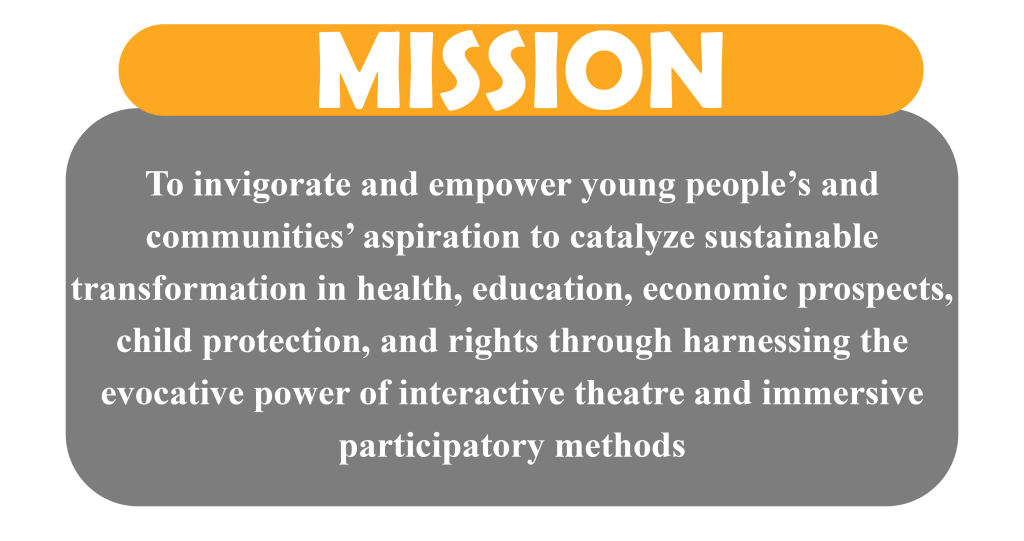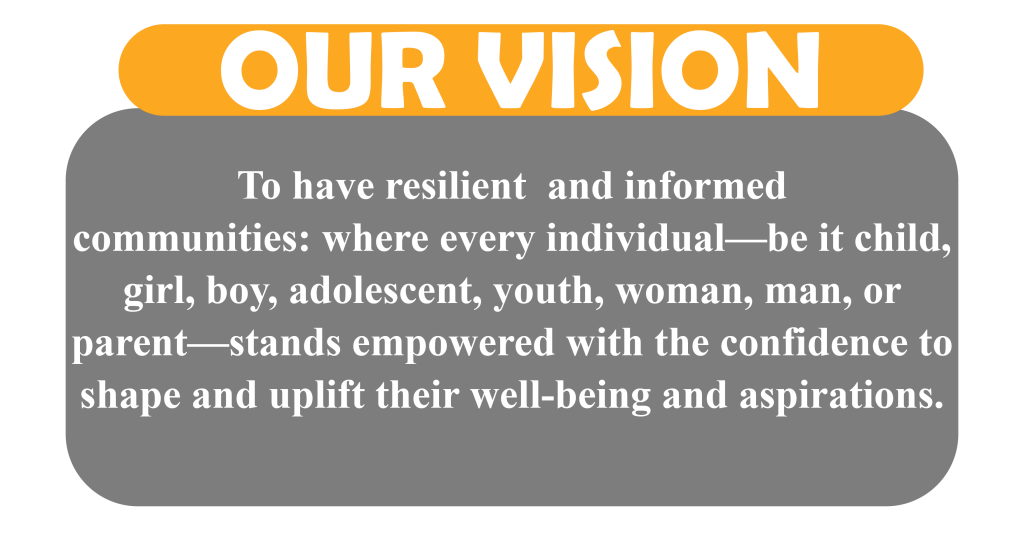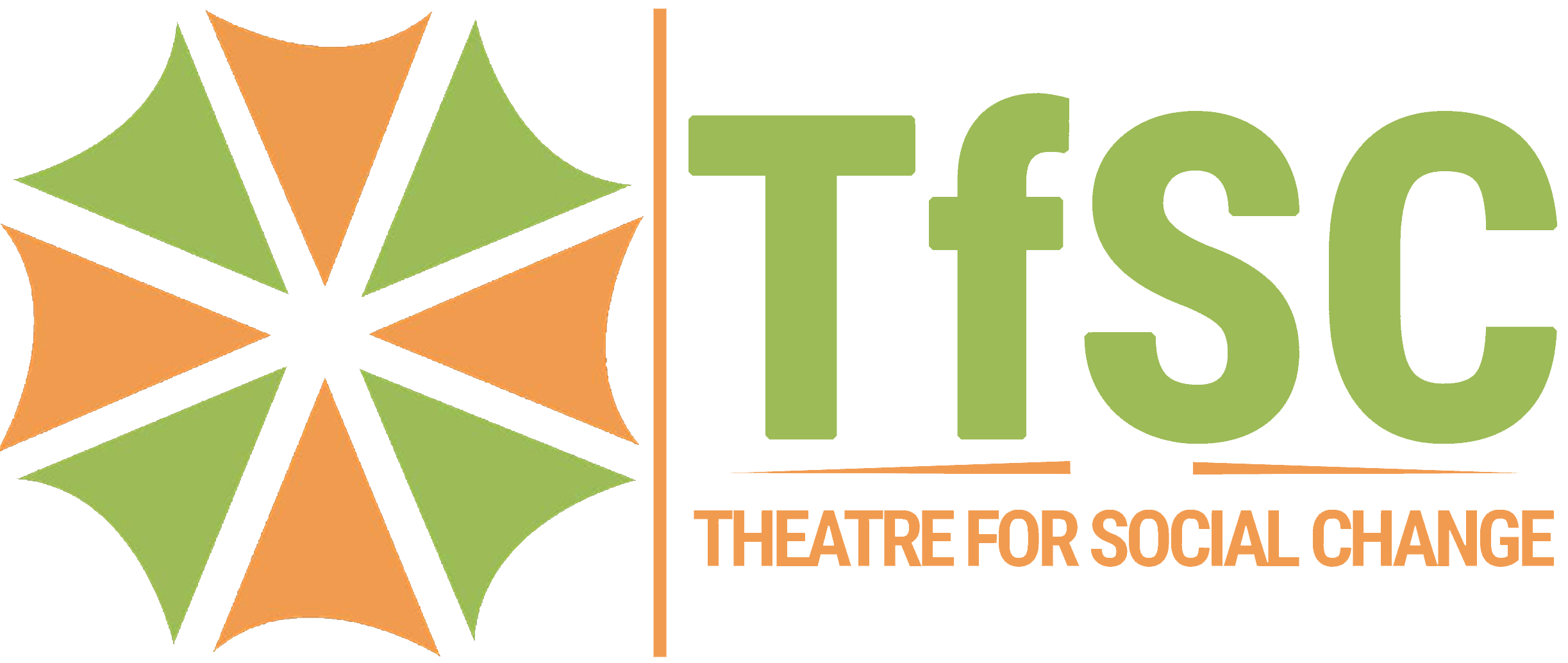

ABOUT TfSC
Theatre for Social Change (TfSC) is an innovative non-profit organization that has been working in Ghana since 2004. The organization was established in response for the need for Ghana to use a more participatory approach in reducing the spread of HIV and AIDs pandemic and bring about sustainable transformation that improves people’s lives. Interactive theatre was introduced as a social and behavior change communication tool to creating awareness, inform and educate the general public on HIV and AIDS and thereby created demand for the uptake of services such as HIV Testing and Counselling (HTC); and bridged the communication gap that was leading to the spread of the HIV pandemic in Ghana. The approach has proven effective in promoting behavior change in key, vulnerable and general populations in Ghana. Interactive Theatre has since been used to support Ghana AIDS Commission and the Ghana Health Service in health promotion activities, created demand for the uptake of health services and contributed to moving some health indicators in Ghana in the positive direction. TfSC has expanded its approach to include community workshops, focus group discussion and group facilitations. Since 2015, TfSC has expanded its thematic areas to include Education, Economic Livelihood and Child Protection and Right. TfSC continue to use interactive theatre as our innovative tool to empower people’s attitudinal and behavioural change by allowing them to examine their own attitudes, practices, socio-cultural environment and behaviour patterns of other people around them. We aim to bridge communication gaps, ensuring that even the most vulnerable among us including those previously hindered by lack of information, access, self-confidence, discrimination, and stigma can avail of essential services that foster sustainable wellbeing of people.

ORGANIZATIONAL OBJECTIVES

Attitudes & Behaviour Transformation
To positively transform the attitudes and behaviours of people, especially young people, by equipping them with relevant knowledge, skills, and resources

Capacity Building
To build the capacity of other partners and stakeholders to use Interactive Theatre as a participatory approach to learning and transforming lives positively

Advocacy
To create an enabling environment to promote health, education and socio-economic rights of young people and communities among policy and decision makers to influence positive and strategic changes.
OUR METHODOLOGY/TECHNICAL STRATEGY
TfSC Methodological Approach:
TfSC embraces an integrated, rights-based methodology, utilizing diverse approaches such as Gender Equality and Social Inclusion (GESI), human-centered design, and the Social Ecological Model (SEM). We’ve developed the Social Behaviour Change REACH Model (SBC REACH Model) to effectively implement interventions across our thematic areas.
The SBC REACH Model Aims to:
- Recognize: individuals’ understanding of behaviours, attitudes, practices, beliefs, and challenges impacting their wellbeing.
- Explore: solutions, ideas, and methods to address barriers and conflicting demands emerging from ingrained beliefs and practices.
- Act: individuals work on identified solution through planning, organizing, and learning, amplifying successes and curtailing failures.
- Celebrate: individuals’ preferences and differences by committing to accepting and sustaining newly values and positive behaviours
- Harness individuals’ multicultural diversity, equity, inclusion, belonging and life experiences to successfully connect with the new knowledge and behaviours to improve themselves and other people around them.
Interactive Theatre:
TfSC’s use of interactive theatre is a fulcrum in our approach. This method allows for profound reflection, encouraging participants to question societal attitudes, norms, and practices. Our belief is simple: genuine social change begins with every individual’s interest and opinion from his/her common awareness or the grassroots.
Our interactive strategy is built on the SBC REACH Model, complementing other participatory methods and theatrical techniques.
Community Focus Group Discussions (CFGDs):
- Purpose: CFGDs serve as platforms to spark discussion on prevalent issues, offering participants a safe space to voice their perspectives, frustrations and insights as well as educating them on relevant and factual information.
- Process: These discussions aid in understanding community challenges and identifying knowledge and communication gaps. They are essential in the conception phase, guiding the development of drama themes and stories that resonate with community experiences.
- Outcome: CFGDs cultivate a sense of community ownership and involvement, shaping our interventions to be more contextually relevant and effective.
Behaviour Change Workshops:
- Purpose: These workshops are designed to be transformative experiences, providing participants with activities that bolster their confidence, communication, negotiation, and assertiveness skills.
- Process: Through the application of Human Centered Development, Social Ecological Model, Behaviour Insight, and Gender Transformative approaches, participants embark on a journey of self-discovery, confronting and reshaping deep-seated beliefs and behaviours.
- Outcome: By the end of these workshops, participants emerge more empowered, equipped with the skills and knowledge to champion change in their communities.
Interactive Theatre Performances:
- Purpose: These performances serve as advocacy tools, fostering dialogue among varied interest groups, including policy makers, parents, opinion leaders, and service providers.
- Process: Unlike traditional theatre, the audience plays an active role, guiding the storyline and seeking pragmatic solutions to community challenges. This method is participatory, ensuring the audience is not just a passive observer but an active participant.
Outcome: Such performances stimulate collective community introspection and action, fostering an environment conducive to positive change.
